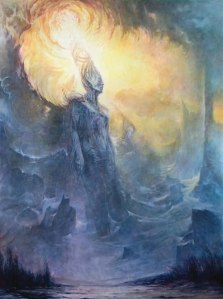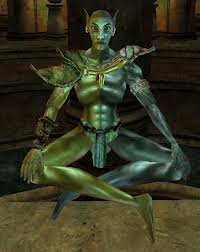“There was Eru, the One, who in Arda is called Ilúvatar.” The Silmarillion
Religion forms an integral part of worldbuilding stemming all the way from Tolkien. From its beginning, Middle Earth has mythology that lies so much deeper than it would seem from just The Lord of the Rings.
In my experience, however, I’ve noticed that not all gods were created equal. If we go back to Tolkien, we see that Ilúvatar is more powerful than the Ainur, which in turn are divided into the Valar and Maiar. The Valar, though inferior to their creator, are the gods of Middle Earth, though they are strict non-interventionists. With the exception of Melkor who the elves named Morgoth, the Valar let Middle Earth grow on its own.
The Maiar are a bit of a different matter. They actually do interfere, more frequently than you would think. For example, Gandalf, Sauron, and the Balrog are all Maiar (ah the meddling of Gandalf).
This suggests three tiers of divine power that I’ll call Supreme (Ilúvatar), Pantheonic (Valar), and Demi (Maiar). Then there’s the people, who I’ll call (borrowing a term from the Death Gate Cycle) Mensch. Like all definitions, it’s actually a little tricky to define these levels, but I’ll do my best.
Supreme gods have the power of creation. They generally do not interfere in the affairs of mortals, and there’s usually only one in each world.
Pantheonic refers to gods that have divine power but did not actively participate in creation. They generally do not interfere, but do so more frequently than Supreme gods. Most frequently there are a lot of them (hence the name).
Demigods are the lowest tier of god and commonly (but not necessarily) are the offspring of god and man. They still have divine powers, but much weaker than their Pantheonic cousins. Not all Demigods are necessarily immortal, and I’d say the biggest defining characteristic of Demigods is that they live on the earth.
I’m going to use the term Mensch to describe non-gods to be sufficiently generic. Not all gods are immortal (though the vast majority are), and not all non-gods are mortal (just look at elves), so the term mortal doesn’t really apply.
Now, onto the examples!
“There is beauty in death—the beauty of finality, the beauty of completion.”—Ati (Ruin) The Hero of Ages.
Ruin is a bit of a strange case because he actually participated in the creation of the world of Mistborn, Scadriel, but he didn’t create on his own, so he gets relegated to Pantheonic status.
Now let’s look at what makes him work:
1.He has a goal
It’s not too much of a spoiler to say that Ruin wants to destroy the world (it’s in his name after all). One key here is to make him a character, someone that we might not like much, but we can still sympathize with him.
2.His power has limitations
I can’t say too much here without spoilers. Sorry. Suffice it to say, the fact that he can’t just wave a hand and blow up the world is pretty significant.
3.He has very human flaws
He’s arrogant, and he taunts the protagonist relentlessly. In a sense, it makes him terrifying and builds tension about how the hero could possible defeat a god
“Defy me, and you will know what it is to stand against a god.”—Vivec, The Elder ScrollsIII: Morrowind.
Ah, The Elder Scrolls. This series stands up as one of the best (perhaps the best) example of worldbuilding in a video game. I classify Vivec as a Demigod because he lives in his temple at the back of the city he (humbly) had named after himself.
What makes Vivec work:
1.He’s the head of the Tribunal Temple
Vivec runs a religion that spreads all the way through Vvardenfell with its priests, adherents, and warriors. This structure makes it feel like a real religion and gives the Dunmer people greater depth.
2.He’s not perfect and has a dark past
Much of the game is about uncovering what happened under Red Mountain on the day Nerevar died. Many even say that Vivec and the others of the Tribunal (Sotha Sil and Almalexia) killed the ancient hero. This conspiracy helped draw me into the game and make me want to discover for myself what happened.
3.There’s a big mystery about how he ascended to godhood
The official Temple documents (I love the books in Elder Scrolls games) state that after emerging from Red Mountain, Vivec was a god. Uh… How did this happen? Once again, this sets up a mystery plot that kept me on the edge of my seat.
As a bit of an aside, Vivec helps you beat the game, but it’s actually possible to do it without him (though extremely difficult). The fact that this option is there makes the choice more real.
As a quick note, not all gods need to be present. Just take Telhu from The Name of the Wind. All we have is stories about him, but these stories make the Tehlin church feel real.
I’d say the big things that make god work are that they are actually characters. They have desires, goals, and problems as well as dark secrets. From a worldbuilding perspective, writers can build a religion over these gods like a character, giving depth to the people.



I’ve mentioned elsewhere that I’ve been playing through FFXIV right now, and you know one of the things that irks me the most about its world is that the gods are referred to so often and yet they feel completely bland and boring.
People constantly refer to the seventh hell in this game, or to the fact that they believe in seven hells. They constantly make comments involving “The Gods” but you get no real introduction to these gods.
I think part of what bothers me most if in one of the major promotional videos of the game, they try to seal a primal aeon away and the binding coils they use have the symbols of the world’s twelve gods, as if they’re sealing him by the power of the world’s twelve gods, and yet somehow there’s not actually any belief in the twelve gods playing an active role in this use of their power?
Maybe I just need to search the world more to get it…
About point 3: human flaws.
I think that’s what made stories of Greek and Roman Gods so appealing to the Greeks and Romans, is that despite having tremendous power, they were still just as flawed (if not more so) in character as the mortals they interacted with. Gods of myth can be deceived, hold grudges, kill one another out of jealousy or retribution…
However, in games, I’ve found that Gods usually assume the role of a boss that you have to fight eventually. It’s unfortunate, but Gods are usually never characters in game stories, but rather “contextual lore”, or dungeon bosses. Perhaps because “evil god” is a universally understood concept dating back to pen-and-paper RPGs, and that’s just part of the gaming culture now.
It’s also a common theme in Japanese culture, that Gods are not only flawed in moral character, but that sometimes mortals have had to turn against Gods in their mythology.
However, there are actually a couple games that involve one of the godlike figures as a member of your party. Most notably is the recent Tales of Xillia. One of the main characters is Maxwell, the Lord of Spirits (who created the world they live in).
A couple of the Breath of Fire games also involved one of the demigods being in your party to some extent.
Other games have you capable of “fusing” with the demigods. It’s not completely neglected, but there is a little bit of what you’ve mentioned out there.
Pingback: Gods and Men: Religions of Ipiera | Mind Weave Role-Playing Platform